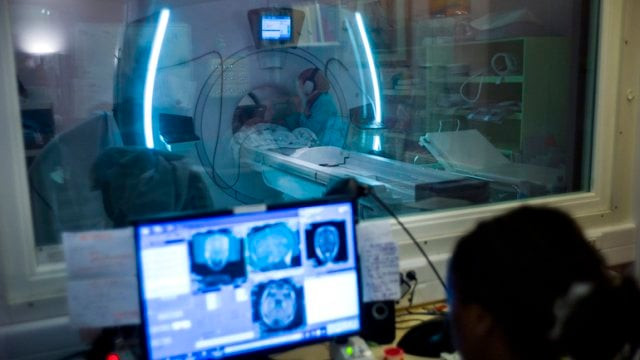Researchers discover way to treat brain cancer more effectively
Scientists have been researching ways to bypass blood-brain barrier for over 50 years

A doctor makes a magnetic resonance imaging (MRI) to a patient at the Argenteuil hospital, in a Paris suburb, on July 22, 2013. PHOTO: AFP
There’s good news for cancer patients as researchers from Pitie-Salpetriere Hospital in Paris have found a way to open the blood-brain barrier and deliver the medicine to brain using ultrasound implant.
University graduates face higher brain tumour risk: study
To make the blood-brain barrier temporarily penetrable, researchers implanted a small 11.5mm device called SonoCloud in the patient’s skull. CarThera, the company that created the device, claims that it can be implanted under local anaesthesia.
"The walls of the blood vessels in the brain are very difficult to cross for certain molecules," Frederic Sottilini, CEO of Paris-based CarThera told Health Day.
"Scientists have been researching ways to bypass this barrier for over 50 years," he added.
With device in place, for each chemotherapy session, micro bubbles are injected into bloodstream of the patient. When micro bubbles reach the cerebral circulation, the implanted device is activated for two minutes to emit ultrasound energy, which temporarily opens blood-barrier for 4- hours. As a result of this, penetration of chemotherapy drugs improves by up to five times resulting in more effective therapy.
Dying Dutchman’s last wish: to build brain cancer app
A pilot project with 15 patients suffering from glioblastoma, an aggressive form of brain cancer, showed that the use of device successfully allowed more medicine to pass through.
While terming the development “significant”, Dr Ekokobe Fonkem, a neuro-oncologist at Baylor Scott and White's Vasicek Cancer Treatment Center, Texas said emphasised that larger trials are needed before this device can be used in cancer treatment.
"We have to see if there is any clinical benefit," he said. "They have to show it works without increasing side effects."
Have something to add to this story? Share it in the comments below.



















COMMENTS
Comments are moderated and generally will be posted if they are on-topic and not abusive.
For more information, please see our Comments FAQ